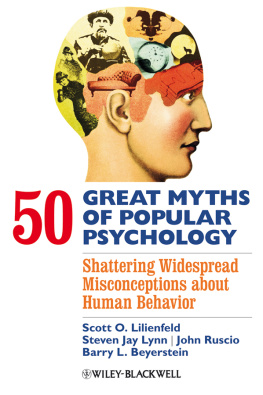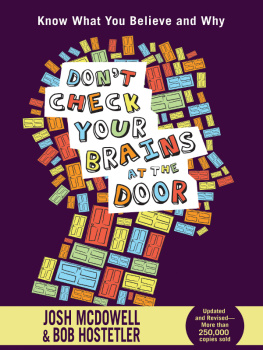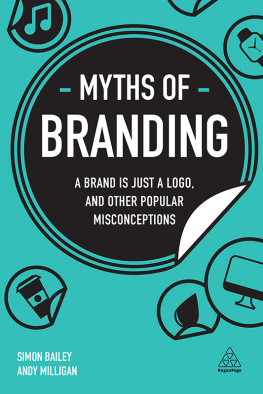APPENDIX
Recommended Websites for Exploring Psychomythology
Reference List for Articles about Psychology Misconceptions:
http://cwx.prenhall.com/bookbind/pubbooks/morris2/chapter1/medialib/demo/3.xhtml
Student Misconceptions in the Psychology Classroom by Stephen Chew:
http://teachpsych.org/resources/e-books/eit2004/eit04-03.pdf
Myths about Famous Psychological Studies:
http://www.thepsychologist.org.uk/archive/archive_home.cfm?volumeID=21&editionID=164&ArticleID=1394
Urban Legends Reference Page: http://www.snopes.com/
Student Misconceptions about the Psychology Major:
http://209.85.215.104/search?q=cache:kjTSkDR6-0oJ:psychclub.monmouth.edu/assets/Career_Psychology%2520You%2520Think%2520You%2520Know.doc+student+misconceptions+psychology+major+monmouth&hl=en&ct=clnk&cd=1&gl=us
Common Statistical Myths (by Schulyer Huck):
http://www.psypress.com/statistical-misconceptions/
PsychBlog 10 Mind-Myths:
http://www.spring.org.uk/2008/04/10-mind-myths-do-any-of-these-catch-you.php
Self-help Myths (by Annie Murphy Paul): http://psychologytoday.com/articles/pto-20010301-000044.xhtml
John Stossels Top 10 Media Myths:
http://abcnews.go.com/2020/story?id=123606
Popular Medical Myths (Some Relevant to Psychology):
http://www.thepsychologist.org.uk/archive/archive_home.cfm?volumeID=
21&editionID=164&ArticleID=1394
Longview Community College Critical Thinking across the Curriculum Project featuring 12 widespread psychology misconceptions:
http://mcckc.edu/longview/ctac/psychology/commonsense3.htm
Time, etc., Ten Myths about the Brain:
http://www.time-etc.com/2007/06/ten-myths-about-brain.xhtml
Memory and Learning: Myths and Facts:
http://www.supermemo.com/articles/myths.htm
Myths about Early Brain Development:
http://www.brainskills.co.uk/MythsFactsEarlyBrainDevelopment.xhtml
Myths about False Memories:
http://www.bfms.org.uk/site_pages/myths_page.htm
Hypnosis Myths:
http://www.nhne.com/misc/hypnosis.xhtml
Sleep Myths:
http://www.sleepfoundation.org/site/c.huIXKjM0IxF/b.2466811/k.4CDC/Sleep_Myths Fact_or_Fiction_Quiz.htm
http://longevity.about.com/od/lifelongenergy/tp/sleep_myths.htm
Myths about Sports Psychology:
http://www.mentalgamecoach.com/articles/SportsPsychologyMyths.xhtml
John Grohols Top Ten Myths of Mental Illness:
http://psychcentral.com/blog/archives/2008/06/13/10-myths-of-mental-illness/
Misconceptions about Eating Disorders:
http://www.healthyplace.com/eating-disorders/main/myths-and-misconceptions-about-eating-disorders/menu-id-58/
Alcohol and Alcoholism Myths:
http://www2.potsdam.edu/hansondj/AlcoholFactsandFiction.xhtml
http://www.cnn.com/2007/EDUCATION/03/07/activity.alcohol.myths/index.xhtml
Common Misconceptions about Psychotherapy:
http://ezinearticles.com/?Common-Misconceptions-About-Psychotherapy&id=674132
POSTSCRIPT
Truth is Stranger than Fiction
In this book, weve surveyed the vast landscape of psychomythology and tried to persuade you to question your common sense when evaluating psychological claims. To accomplish this goal, weve focused on dispelling a wide array of mistaken beliefs about human behaviorbeliefs that accord with our intuitions, but that are false. In the books closing pages, we wish to accomplish this goal in a different, but complementary, way, namely, by highlighting a sampling of psychological findings that violate our intuitions, but that are true.
As Carl Sagan (1979) noted, one of the best antidotes to pseudoscience is genuine science. As Sagan reminded us, scientific fact is often far strangerand more fascinatingthan is scientific fiction. Indeed, we suspect that most people would be less susceptible to the seductive influence of psychological myths if they were sufficiently aware of genuine psy chological knowledge. Such knowledge, as Sagan pointed out, fulfills our deep-seated needs for wonder, but has a decided advantage over mythology: Its true.
So here, in no particular order, is our own list of 10 difficult to believe, but true, psychological findings (for compilations of other remarkable or surprising psychological findings, see Furnham, 1996; Stine, 1990; Wiseman, 2007). Many of these findings may strike us as myths because they are counterintuitive, even bizarre. Yet they are much better sup ported by scientific research than the 50 beliefs weve examined over the preceding pages. They remind us to doubt our common sense.
Ten Psychological Findings that Are Difficult to Believe, but True
(1) Our brains contain about 3 million miles of neural connections, that is, connections among brain cells (Conlan, 1999). If lined up next to each other, these connections would stretch to the moon and back about 12 times.
(2) Patients whove experienced strokes in their brains left frontal lobes, which result in severe language loss, are better at detecting lies than are people without brain damage (Etcoff, Ekman, Magee, & Frank, 2000). This may be because people whove lost language develop compensatory nonverbal skills that help them to spot deception in others.
(3) People with extreme forms of anterograde amnesia, a memory disorder marked by an inability to consciously recall new information, may repeatedly (even over many years) express catastrophic shock when told of the death of the same family member, and reread the same magazines dozens of times without remembering them (see p. 79). Yet they often exhibit implicit (unconscious) memory for certain events without being able to recall them consciously. For example, they may display a negative emotional reaction to a doctor whos been rude to them even though they have no recollection of having ever met him (Shimamura, 1992).
(4) People with a rare condition called synesthesia experience cross- modal sensations, that is, those that cut across more than one sensory modality. They may hear specific sounds when they see certain colors, or experience specific smells when they hear certain sounds. Still others may see certain words, like book, in certain colors, like blue (Cytowic, 1993). Brain imaging research demonstrates that synesthetes (people with synesthesia) display activity in multiple brain areas; for example, sound-color synesthetes display activity in both their auditory and visual regions when they hear sounds.
(5) Psychologists have taught pigeons to distinguish paintings by Monet from those of Picasso, and musical compositions by Bach from those of Stravinsky (Watanabe, Sakamoto, & Wakita, 1995), offering further evidence that the term bird brained may actually be a compliment rather than an insult. Over the course of many trials, the birds receive rewards for correct answers, and gradually learn to detect cues in the art and music that allow them to distinguish one creative genius style from the other.
(6) People asked to hold a pencil with their teeth find cartoons funnier than do people asked to hold a pencil with their lips (Strack, Martin, & Stepper, 1988). If we think about it for a moment, well realize that people asked to hold a pencil with their teeth are forming a facial expression close to a smile, whereas people asked to hold a pencil with their lips are forming a facial expression close to a frown. One explanation for this peculiar finding is the facial feedback hypothesis: the facial muscles feed back temperature information to our brains, which in turn influences our emotions (Zajonc, Murphy, & Inglehart, 1989). Interestingly, research shows that words that contain a k sound (which also make us smile when we say them)like wacky, kooky, and quack are especially likely to make us laugh (Wiseman, 2007).
Next page






